MercoPress. South Atlantic News Agency
Tag: International Monetary Fund
-
Saturday, April 6th 2019 - 09:33 UTC
IMF releases US$10.8 billion to Argentina and insists on fiscal prudence

The Executive Board of the International Monetary Fund (IMF) completed on Friday the third review of Argentina’s economic performance under the 36-month Stand-By Arrangement (SBA) that was approved on June 20, 2018. The completion of the review allows the authorities to draw the equivalent of SDR 7.8 billion (about US$10.8 billion), bringing total purchases since June 2018 to SDR 28.01371 billion (about US$38.9 billion).
-
Saturday, March 16th 2019 - 10:15 UTC
IMF prepared to help Argentina stabilize exchange market volatility in election year
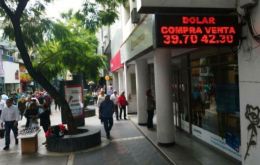
Argentina’s central bank wants to license market makers to help stabilize its embattled peso currency when the Treasury starts newly announced dollar sales in April. The bank hopes the market makers, dealers who agree to buy and sell at set prices, would bolster liquidity in the exchange market to help avoid the sharp gyrations the peso has suffered in recent weeks when it hit a record low of 42.5 pesos per dollar in thin trading.
-
Tuesday, February 26th 2019 - 09:07 UTC
Trump anticipates a “signing summit” with China's Xi: trade agreement “very, very close”

US President Donald Trump said on Monday he expects to hold a “signing summit” with China’s President Xi Jinping to seal a trade deal, since negotiators are “very, very close” to an agreement. Cheering global stock markets, the new comments confirm the dispute will not ratchet up immediately, averting an even bigger impact on the global economy.
-
Monday, February 25th 2019 - 09:09 UTC
Ecuador reaches an agreement with IMF and will receive US$ 4.2 billion

Ecuador and the International Monetary Fund (IMF) staff have reached an agreement on a set of policies to underpin a US$4.2 billion (435% of quota and SDR3.035 billion) arrangement under the IMF’s Extended Fund Facility (EFF). This arrangement, which is subject to IMF Executive Board approval, would provide support for the Ecuadorian government’s economic policies over the next three years.
-
Tuesday, February 12th 2019 - 10:30 UTC
IMF mission in Argentina to collect data on compliance of the standby loan accord
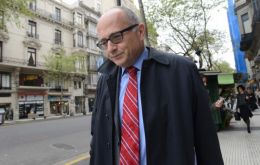
An IMF team is back in Buenos Aires to review the Argentine economy performance and how it is complying with the fiscal and monetary conditions established in the stand-by US$ 57 billion loan agreed last year. The head of the mission Roberto Cardarelli is scheduled to meet ministers, central bank officials, members of Congress from the ruling coalition and opposition, academia and different lobbies.
-
Saturday, February 2nd 2019 - 08:59 UTC
Argentine central bank “ready” to counter surprises ahead of this year's presidential election
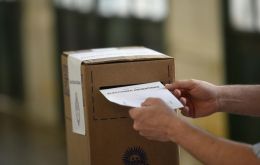
Argentina’s central bank has sufficient dollar firepower to deal with a spike in demand for the greenback if uncertainty over the country’s upcoming presidential election prompts another run on the peso, bank sources said on Friday.
-
Monday, January 28th 2019 - 09:09 UTC
Ecuador planning IMF support to balance the budget and implement reforms
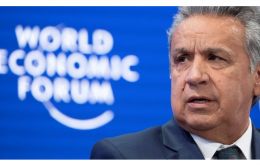
Ecuador may use financing from the International Monetary Fund (IMF) to balance its budget, as the South American country seeks to reduce a swollen fiscal deficit and its international debt, the finance minister admitted on Friday.
-
Friday, January 25th 2019 - 10:10 UTC
Argentine twelve-month economic activity to November contracts 7.5%

Economic activity in Argentina slumped 7.5% in November, the INDEC statistic bureau reported on Thursday. The comparative drop in activity from November 2017 and November last year was the most significant since June 2009's eight per cent slump.
-
Wednesday, January 23rd 2019 - 09:14 UTC
Argentine central bank intervenes to support the US dollar: buys US$ 50m
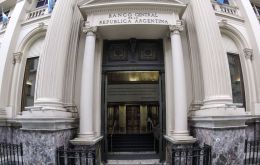
Argentina’s central bank said it bought US$ 50 million at an average price of 37.597 Pesos per dollar in the foreign exchange market on Tuesday, part of its effort to maintain the currency in a trading band agreed with the International Monetary Fund.
-
Tuesday, January 22nd 2019 - 10:03 UTC
Escalating trade tensions and financial markets could undermine global growth, says IMF's latest report
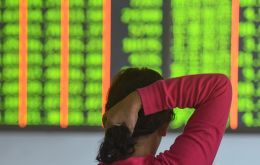
The International Monetary Fund has warned that escalating trade tensions could undermine global economic growth. In a new report on the world economic outlook, the IMF also warns of risks from a no-deal Brexit. For the world economy, the IMF is now predicting growth of 3.5% in 2019. In October, it forecast 3.7%.
